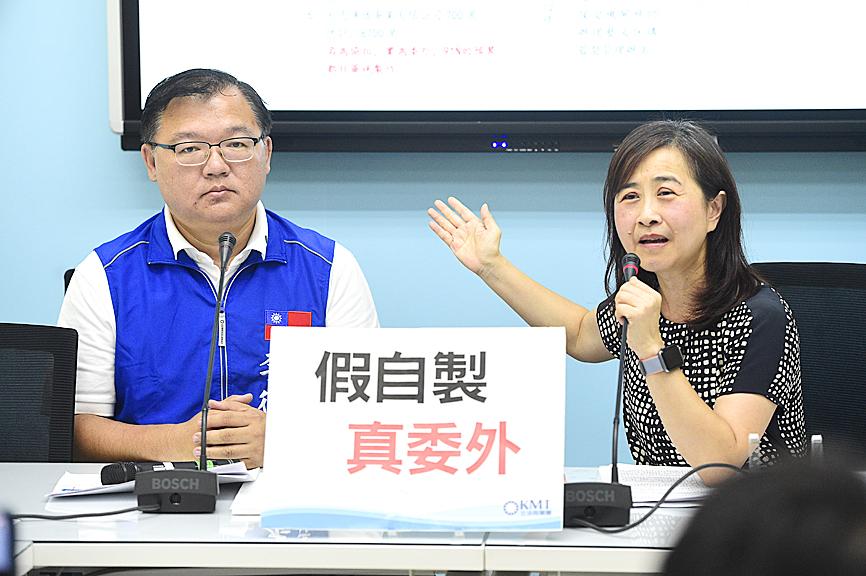Chinese Television Systems (CTS) officials yesterday rejected accusations by Chinese Nationalist Party (KMT) lawmakers that the public channel had contravened government procurement regulations on NT$96 million (US$3.25 million) production budget from the Ministry of Culture.
KMT legislators Lin Yi-hua (林奕華) and Lee De-wei (李德維) had earlier told a media briefing that CTS was given the money to produce its own programs, but had awarded programming contracts to firms with connections to CTS executives.
“The Ministry of Culture signed an agreement for CTS to produce its television programs with the NT$96 million subsidy. The agreement stated that CTS must invite bid by open tender, but it did not do so,” Lin said.

Photo: George Tsorng, Taipei Times
“Instead, CTS gave production projects directly to five outside companies, which received a total of NT$87 million, or 91 percent of the ministry’s subsidy,” Lin said. “We suspect CTS officials handed the projects to companies operated by their friends.”
CTS, one of the nation’s three oldest terrestrial TV networks, was founded in 1971 and was controlled by the Ministry of National Defense, which staffed all of its divisions with military personnel, until the channel was incorporated into the public Taiwan Broadcasting System (TBS) in 2006.
“TBS must raise its standards for adhering to proper procedures. We demand an investigation by the government ethics office, since CTS had deviated from the procedures the culture ministry stipulated in the agreement,” Lee said.
CTS issued a statement rejecting the accusations.
“We followed the proper procedures as stated in the agreement, which outlined our ‘own production, with outside collaboration for filming.’ Numerous meetings were convened by an ad hoc committee during the planning and initial stages, with two committee members from CTS and three from outside,” the statement said.
“Through the filming and production stages, Ministry of Culture officials were informed about the collaboration with outside companies and the division of work for the projects,” it said.
“The whole process adhered to the law, and conformed to strict internal control and oversight by CTS, although some phases in the process might have had shortcomings,” it said. “However, the lawmakers’ accusation that CTS had ‘handed out contracts to companies in an illicit manner’ is incorrect, as such actions did not take place.”
The Ministry of Culture issued its own statement, saying: “All the programming projects under the CTS agreement complied with the Government Procurement Act (政府採購法).”
“CTS, as a member of TBS’ public television service, needed to expand its programming in Taiwanese [also known as Hoklo], both for better quality and more variety of programming, as well to support the ‘Taigi Channel’ (台語台) under the Public Television Service,” it said.
“Therefore the ministry helped to obtain the funding, and abided by the professionalism and programming production of works under taken by CTS. These projects have been completed, with proper checks on accounting and verification of expenses in the finalized reports, in accordance with the Government Procurement Act,” the culture ministry statement said.

A Taiwanese software developer has created a generative artificial intelligence (AI) model to help people use AI without exposing sensitive data, project head Huang Chung-hsiao (黃崇校) said yesterday. Huang, a 55-year-old coder leading a US-based team, said that concerns over data privacy and security in popular generative AIs such as ChatGPT and DeepSeek motivated him to develop a personal AI assistant named “Mei.” One of the biggest security flaws with cloud-based algorithms is that users are required to hand over personal information to access the service, giving developers the opportunity to mine user data, he said. For this reason, many government agencies and

The National Fire Agency on Thursday said a series of drills simulating a magnitude 8.5 earthquake would be held in September to enhance the government’s emergency response capabilities. Since earthquakes cannot be predicted, only by continuously promoting disaster prevention measures could Taiwan enhance its resilience to earthquakes, agency Director-General Hsiao Huan-chang (蕭煥章) said in a news release. The exercises would be held to mark annual National Disaster Prevention Day on Sept. 21, the aim of which is to test Taiwan’s preparedness and improve its earthquake resilience in case of a major temblor, Hsiao said. As part of those drills, an earthquake alert would

DEFENSE: The National Security Bureau promised to expand communication and intelligence cooperation with global partners and enhance its strategic analytical skills China has not only increased military exercises and “gray zone” tactics against Taiwan this year, but also continues to recruit military personnel for espionage, the National Security Bureau (NSB) said yesterday in a report to the Legislative Yuan. The bureau submitted the report ahead of NSB Director-General Tsai Ming-yen’s (蔡明彥) appearance before the Foreign and National Defense Committee today. Last year, the Chinese People’s Liberation Army (PLA) conducted “Joint Sword-2024A and B” military exercises targeting Taiwan and carried out 40 combat readiness patrols, the bureau said. In addition, Chinese military aircraft entered Taiwan’s airspace 3,070 times last year, up about

STRICTER ENFORCEMENT: Taipei authorities warned against drunk cycling after a sharp rise in riding under the influence, urging greater public awareness of its illegality Taipei authorities have issued a public warning urging people not to ride bicycles after consuming alcohol, following a sharp rise in riding under the influence (DUI) cases involving bicycles. Five hundred and seven people were charged with DUI last year while riding YouBikes, personal bicycles, or other self-propelled two-wheelers — a fourfold increase from the previous year, data released by the Taipei Police Department’s Traffic Division showed. Of these, 33 cases were considered severe enough to be prosecuted under “offenses against public safety,” the data showed. Under the Road Traffic Management and Penalty Act (道路交通管理處罰條例), bicycles — including YouBikes and other